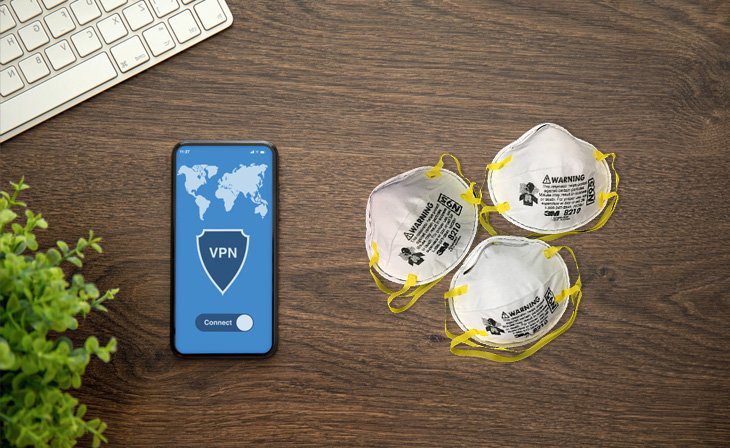Blogs

5 Shady Email Campaigns Hackers Are Launching To Trick People During Coronavirus
March 20, 2020
7 Key Takeaways from RSA 2020 Conference That Will Open Your Eyes
April 2, 20204 Reasons Why Your Remote Workers Must Use A Dedicated VPN During Coronavirus Outbreak
Digital technology has changed the way we used to do things. From shopping to entertainment, learning, and communication, the Internet has left its mark on every facet of our lives. Workplaces are no exception to this rule. Gone are the days when you were tied to your workstation to get work done. Today, you can work from anywhere, anytime, thanks to remote work and secure tools like a dedicated VPN. And in light of the sudden novel coronavirus – COVID-19 outbreak, social distancing and remote working have become imperative for our survival.
The flexible schedule, ability to work from any location and ability to spend quality time with their families make remote work a preferred choice for employees. On the other side of the spectrum are employers who can reap the benefits like increased employee loyalty, reduced overhead, higher job satisfaction and higher employee retention. This makes remote work a win-win situation for both employees and employers.
The problem with remote work is that when a remote worker tries to access critical business information, there is a risk of that information being stolen. As a business, you don’t want that. To ensure your web browsing sessions stay private, you should use HostNOC’s dedicated VPN. Not sure whether you should purchase a dedicated VPN for your remote workers or not? You are at the right place.
In this article, you will learn about four reasons why remote workers should use a dedicated VPN during the coronavirus pandemic.
1. Stay Safe on Public Wi-Fi
The ability to work from anywhere provides remote workers with the freedom they are looking for. That is why you will see remote working from home, using public Wi-Fi in coffee shops and other places to complete their tasks. There are instances where it is hard to find internet connectivity. That is where you have to rely on public wireless networks. Unfortunately, public Wi-Fi is not safe. Hackers can easily steal your login credentials and get access to other sensitive information. As a responsible remote worker, you don’t want that, right? Dedicated VPN offers a perfect solution to this problem by helping you stay safe even on public Wi-Fi so you can browse the web in your favorite coffee shop without worrying about getting hacked. It encrypts all the information sent across the wireless network, preventing hackers from stealing the information during transit.
2. Surf the Web Anonymously
The Internet was a free medium when it was first launched, but as time passed, things started to change for the worse. Today, governmental agencies, tech giants and even your internet service provider keep an eye on your online activities. Internet surveillance has jeopardized freedom of speech and forced internet users to be careful about what they post online. This has made privacy a major concern for internet users.
This can have dangerous consequences if you are a remote worker dealing with sensitive business information. Thankfully, there are ways to surf the web anonymously. One of the best ones is using a dedicated VPN. By using a VPN, you can stay anonymous online and prevent government agencies, ISPs and tech giants from invading your privacy.
3. Download Content Safely
There are instances when you have to download sensitive files while you are traveling. It can be a bit tricky as you have to be completely sure that the source you are downloading the files from is safe. It is easier to get fooled by a dodgy source and think of it as a legal one. This is known as spoofing. Many hackers use this tactic to trick users into entering their login credentials and giving out their sensitive information, thinking that they are using the legitimate website, but they are not.
4. Beat Content Restrictions
Remote workers and freelancers tend to travel abroad frequently, whether it is to attend a conference or meet with clients. Because every country has its own rules, you might not be able to access the same content you could in your country. There are content restrictions that you have to overcome. A dedicated VPN is the best way to do that. It changes your IP address and lets you bypass content restrictions. This means that you won’t be seeing the dreaded “This content is blocked in your country” message on your screen, thanks to a dedicated VPN.
Since we’re living in a highly connected world, where businesses employ talent from all over the globe, including remote or distributed teams, the current coronavirus crisis is forcing remote resources to connect to their employer’s infrastructure from home.
This poses a significant threat to the IT infrastructure of a lot of businesses, as a compromised workstation connecting from a remote location can be used to carry out malicious activities.
Let’s stop our laptops or other devices from becoming proxy soldiers whom hackers might exploit to wage war on our organization’s IT infrastructure.
If you’re looking for a dedicated VPN for your remote team, we have a few fantastic deals for you to grab your hands around. So securely connect now and get the job done with no fear of either COVID-19 or hackers, wherever you may be in the world.
Featured Post
7 Cybersecurity Trends That Will Dominate in 2026
As we approach 2026, the digital landscape continues to evolve at an unprecedented pace, bringing both innovation and new threats. Cybersecurity has become a cornerstone of […]
Black Hat 2025: 10 Cool New Cybersecurity Products Announced At The Conference
Black Hat 2025 conference took place from August 2–7 2025 in Las Vegas, saw a wave of next‑gen security tools focused on AI, agentic systems, data […]
Alarming 5 Findings in IBM’s Cost of Data Breach 2025
Table of Contents 5 Key Takeaways from IBM’s Cost of Data Breach Report 2025 1. AI Is Both a Cybersecurity Ally and an Emerging Target 2. […]












